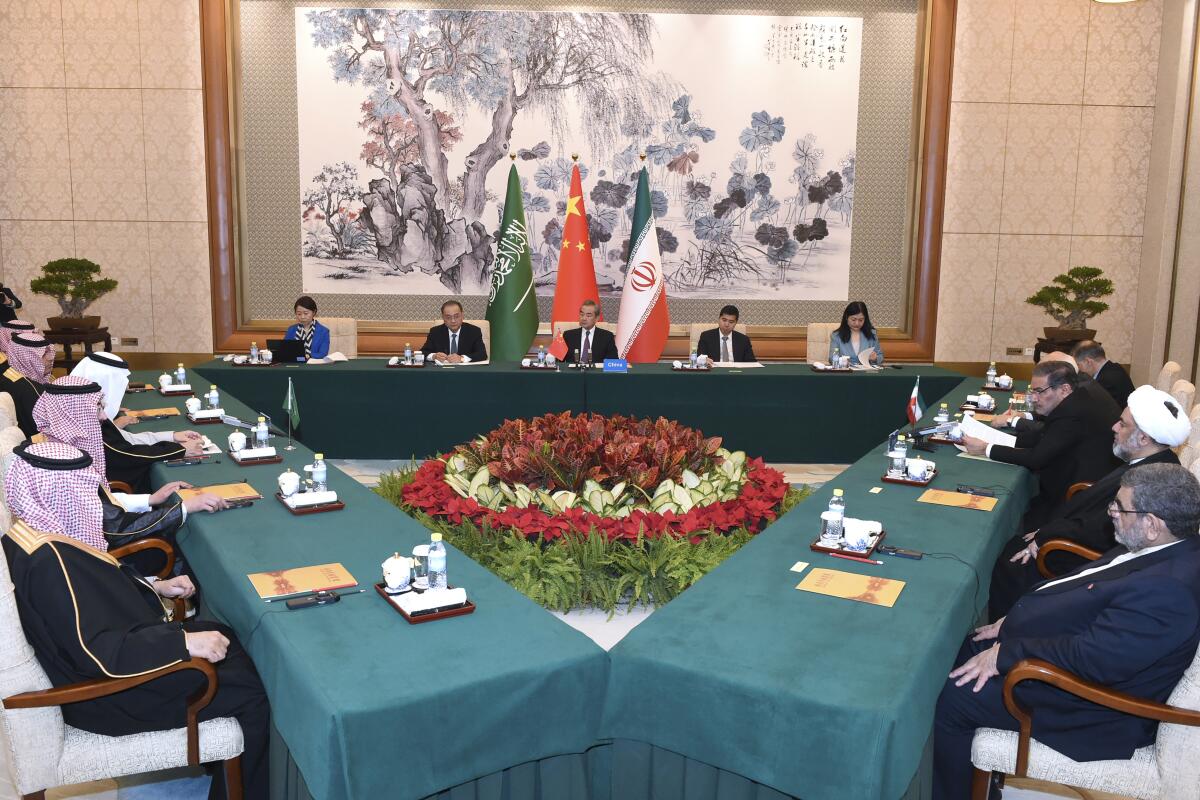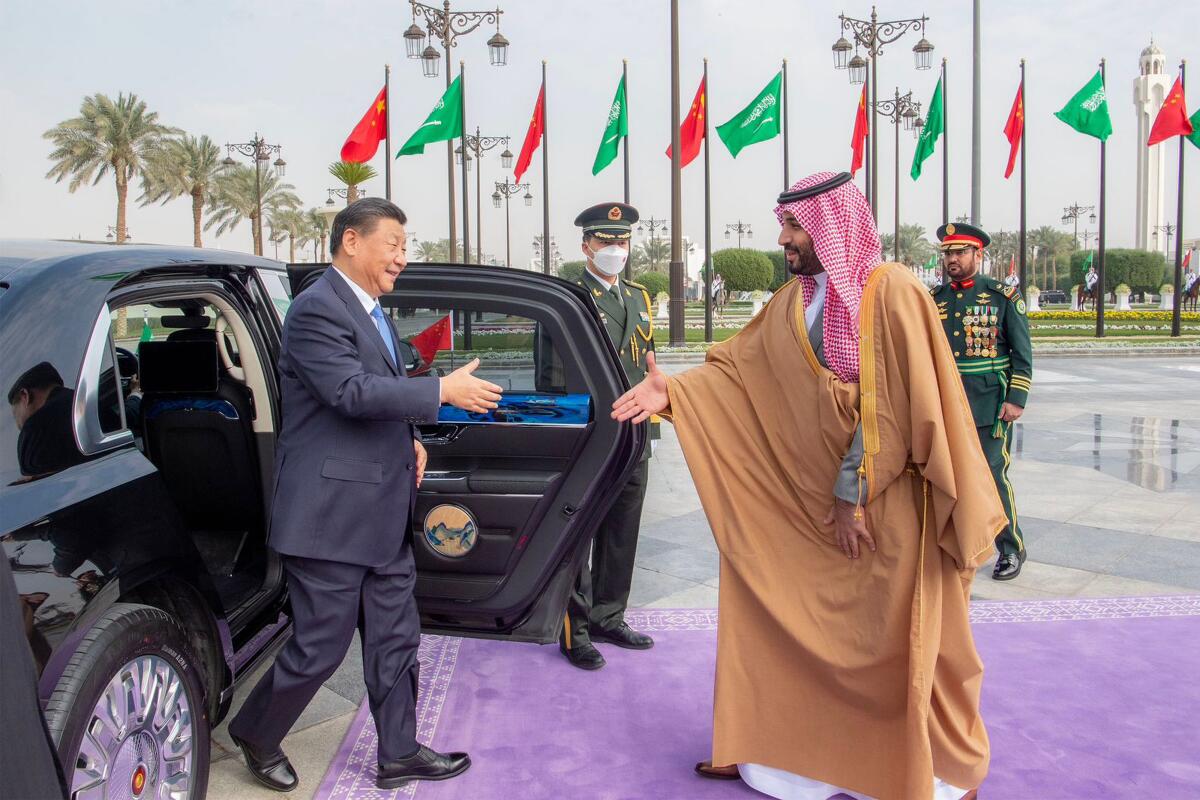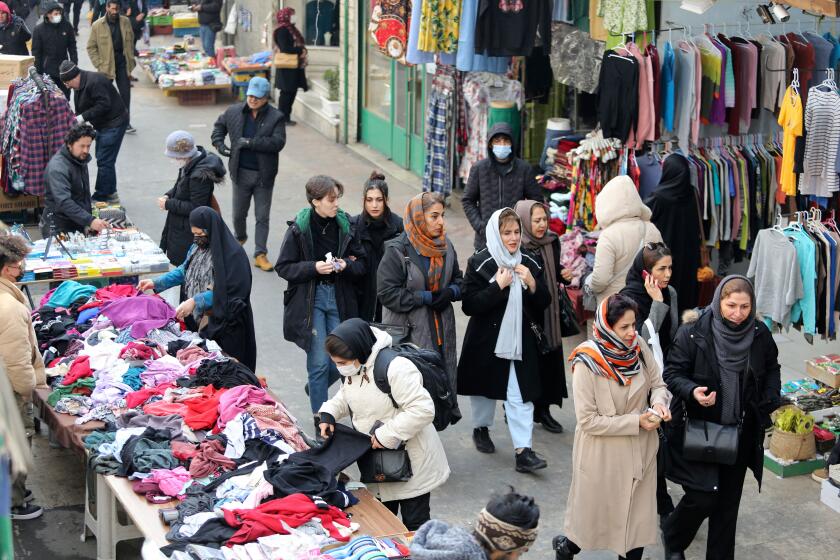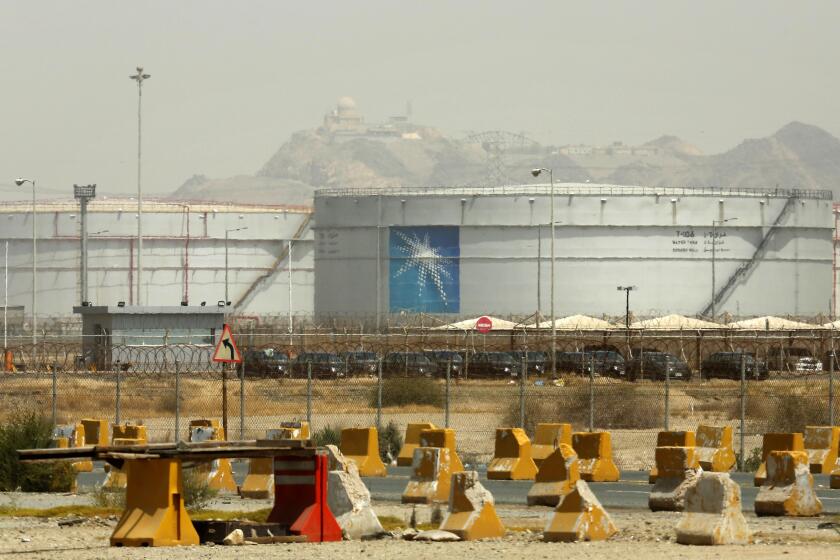News Analysis: Renewed Saudi-Iranian ties, brokered by China, force new calculations in Mideast

- Share via
BEIRUT — The surprise announcement of a resumption of diplomatic ties between Saudi Arabia and Iran, thanks to a deal brokered by Beijing, underscores regional governments’ interest in a de-escalation of tensions — and China’s willingness to wield its economic clout to achieve it.
Although observers, especially U.S. officials, caution against attributing too much credit to Beijing for the deal, which was unveiled Friday, the rapprochement can also be seen as a wake-up call for Washington, with the potential to upend its longtime calculations and relationships in the Middle East.
Forging an alliance against Iran has united the U.S. and numerous countries in the region, and even had the once-unthinkable result of spurring diplomatic ties between Israel and several Arab states that previously refused to acknowledge Israel’s existence.
But the new detente between Tehran and Riyadh, after more than seven years of sometimes-bellicose animosity, signals that regional U.S. allies such as Saudi Arabia are increasingly willing to go their own way. Hopes that the oil-rich kingdom might even join fellow Arab nations such as Bahrain and the United Arab Emirates in recognizing Israel, out of shared fear of Iran, now appear dimmed.
Still, Biden administration officials were quick to voice praise for the diplomatic breakthrough because, if fulfilled, it could ease direct and proxy conflicts plaguing the Middle East. U.S. officials also sought to downplay China’s role, saying Iraq and other Arab gulf states were also involved and noting that this was not an agreement the U.S. could arrange because Washington has no formal relations with Tehran.
“When it comes to our role in the region ... I have a difficult time wrapping my head around ‘our role could be supplanted’ when no country on Earth has done more to help build a more stable, a more integrated region,” State Department spokesman Ned Price said Monday.
Iranians are finding it harder than ever to afford even basic goods as political unrest roils the country and the government cracks down harshly.
But China’s rising role in the Middle East, following its intensive economic and diplomatic activities in Africa and Latin America, has become a geopolitical reality confronting the U.S. and the West.
That’s especially true with regard to Iran, whose sanctions-crippled economy has counted China as its top trading partner for the last decade; in 2021, it signed a deal for Chinese investment of $400 billion over 25 years in exchange for oil. Commerce between the two nations topped $15 billion in 2022, a 7% increase over the year before, Chinese officials say.
China had trade worth $87.3 billion with Saudi Arabia in 2021, making it Riyadh’s top trading partner that year. In December, during a bilateral summit, the two countries signed seven infrastructure deals totaling $1 billion in investments. Saudi Arabia was the single largest recipient of Chinese investment — $5.5 billion — under Beijing’s infrastructure-financing Belt and Road Initiative in the first half of 2022, according to the Shanghai-based Green Finance and Development Center.

“We are not seeking to match the PRC [People’s Republic of China] dollar for dollar in the amounts that they provide to, let’s call them, infrastructure projects around the world,” Price said when pressed on the issue of perceived waning of U.S. influence. “In some ways, we couldn’t do that, given that they have a state-run economy and a command-style economy that we don’t.”
In Friday’s announcement, China, Iran and Saudi Arabia praised the “noble initiative” that will see Tehran and Riyadh reopen embassies in the next two months. Wang Yi, China’s top diplomat, was pictured with Ali Shamkhani, the secretary of Iran’s Supreme National Security Council, and Saudi national security advisor Musaad bin Mohammed Aiban.
Some analysts said the deal was not as big a surprise as it might first have seemed.
The profit by Saudi Aramco, known formally as the Saudi Arabian Oil Co., came off the back of high energy prices after Russia invaded Ukraine.
The two countries had shown a willingness to engage in diplomacy since 2021, with much of the groundwork for a resumption of ties laid at five summits in Iraq and Oman, said Esfandyar Batmanghelidj, the chief executive of the Bourse & Bazaar Foundation, a London-based think tank.
China was not present at those talks.
“Although this felt like an agreement from out of the blue, we should have some confidence it will hold up because it’s part of a longer process, which had reached a culmination,” he said. “What is surprising is that the Chinese offered a platform for mediation, and both sides signed it in Beijing.”
Allowing China to take the initiative — and the credit — for the final push represented a rebuke of sorts of Washington, said Jonathan Fulton, a senior nonresident fellow at the Atlantic Council. And by deliberately excluding the United States, the Saudis, especially, can demonstrate their intention to diversify their backers and interests.
China spies an opportunity to draw closer politically and economically to Saudi Arabia as ties between the U.S. and the oil-rich kingdom falter.
The Saudis and Iranians “are saying, ‘Look, there’s another big power able to do things with us,’” Fulton said, adding that the region’s overriding concern was development and economics rather than picking sides in the great-power competition.
“They want to work with great powers that stabilize the region, and the perception is that the U.S. took a very security-centered approach,” he said.
Where the U.S. has generally deployed economic coercion — sanctions, for the most part — to change behavior in the region while favoring its allies, China has used its position as a top energy importer and regional investor as leverage.
“China’s message is: ‘We won’t pick favorites. We want to engage economically and invest in your prosperity, and as part of that we want to incentivize [you] to take Chinese interests in mind,’” Batmanghelidj said. “And those interests are that China doesn’t want conflict between those countries because it’s dependent on energy exported through the Persian Gulf.”
Start your day right
Sign up for Essential California for the L.A. Times biggest news, features and recommendations in your inbox six days a week.
You may occasionally receive promotional content from the Los Angeles Times.
Many questions face the deal, not least of which is how far both governments will go to reverse years of total rupture and whether its dividends will extend to Yemen, Lebanon, Syria and Iraq — countries where Saudi Arabia and Iran have tussled through political or paramilitary proxies.
The biggest breakthrough could be in Yemen, where a Saudi-led coalition has fought the Iran-backed Houthi militias since 2015, which in turn regularly fire ballistic missiles across Yemen’s northern border into Saudi Arabia. In a statement, Iran’s permanent mission to the United Nations said the deal would accelerate a cease-fire, start a national dialogue and lead to “an inclusive national government” in Yemen.
Though the deal heralds a more active role for Beijing, it also indicates a Saudi foreign policy less moored to U.S. interests.
The Biden administration has found itself at odds with Riyadh on several occasions recently. In addition to lingering outrage over the murder of U.S.-based Saudi journalist Jamal Khashoggi, allegedly on the orders of Crown Prince Mohammed bin Salman, President Biden clashed with Saudi officials when they refused to step up production of oil as Russian energy was being shunned over the war in Ukraine.
Antony J. Blinken had hoped to broach a wide agenda in the Middle East. But after deadly attacks in the region, security again tops the list.
Jon Alterman, director of the Middle East program at the Center for Strategic and International Studies, said the U.S. is struggling with how best to deal with Saudi Arabia, long its most important ally in the gulf region but now a less dependable actor in Washington’s eyes.
“The U.S. government is of two minds” on the Saudis seeking out new partners, Alterman said on the center’s website. “It wants the Saudis to take increasing responsibility for their own security, but it does not want Saudi Arabia freelancing and undermining U.S. security strategies.”
Bulos reported from Beirut and Wilkinson from Washington.
More to Read
Sign up for Essential California
The most important California stories and recommendations in your inbox every morning.
You may occasionally receive promotional content from the Los Angeles Times.
















